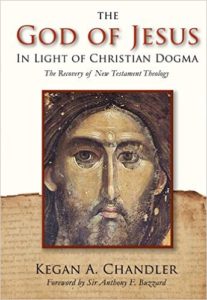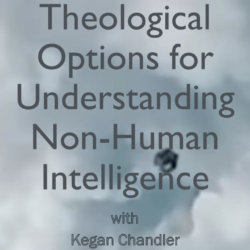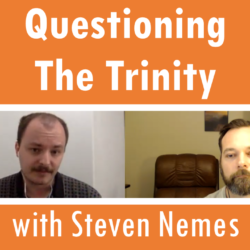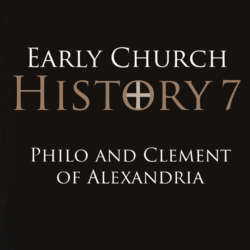 Kegan Chandler joins me once again to talk about the history of theology. If you haven’t yet heard his story, check out Interview 8: A Restorationist Finds the God of Jesus. In this episode, I ask Chandler about his book, The God of Jesus in Light of Christian Dogma. If you are at all interested in the history of ideas that influenced what Christians in the 2nd, 3rd, and 4th centuries believed about Jesus, this show is for you. Chandler address the how Plato’s Greek philosophy influenced Christian theologians as well as how the Gnostics not only anticipated much trinitarian language, but also how they influenced “orthodox” theology. After exposing the pagan influnences on the development of the Trinity, Chandler goes on to offer a better way of reading the New Testament–through the lens of second temple Judaism. Instead of reading later ideas into scripture, why not read it in light of the Hebrew bible and contemporary Jewish literature, like the Dead Sea scrolls.
Kegan Chandler joins me once again to talk about the history of theology. If you haven’t yet heard his story, check out Interview 8: A Restorationist Finds the God of Jesus. In this episode, I ask Chandler about his book, The God of Jesus in Light of Christian Dogma. If you are at all interested in the history of ideas that influenced what Christians in the 2nd, 3rd, and 4th centuries believed about Jesus, this show is for you. Chandler address the how Plato’s Greek philosophy influenced Christian theologians as well as how the Gnostics not only anticipated much trinitarian language, but also how they influenced “orthodox” theology. After exposing the pagan influnences on the development of the Trinity, Chandler goes on to offer a better way of reading the New Testament–through the lens of second temple Judaism. Instead of reading later ideas into scripture, why not read it in light of the Hebrew bible and contemporary Jewish literature, like the Dead Sea scrolls.
Notes and Links:
- Review Kegan Chandler’s The God of Jesus in Light of Christian Dogma: The Recovery of New Testament Theology on Amazon.
- Chandler’s websites include: thegodofjesus.com and burieddeepblog.wordpress.com
- R. P. C. Hanson wrote the definitive history of 4th century doctrinal development in his The Search for a Christian Doctrine of God.
- Richard Rubenstein wrote a much shorter, easier history of Trinity history in his When Jesus Became God.
- Intro music: “District Four” by Kevin MacLeod. Licensed under Creative Commons: By Attribution 3.0 License.







Interesting interview – thanks. Couple of thoughts.
A question I would have liked to ask Kegan is why he thinks that the greco-roman world was so receptive to the palestian Jewish messiah? Could it not have been that the texts of the NT were already a small step in a hellenistic direction? Selling Plato in a Christian bookstore might be a bit extreme, but might it not be slightly suggestive that if Platonists were so receptive that the NT texts might have already begun to bridge the gap (eg Hebrews might be a better example)? If that were the case, then we should ask Kegan if he really starts his quest in the right place.
Secondly, from what I’ve been able to read and understand thus far, I’m simply unconvinced by the modern interpretations of what Jewish monotheism actually meant. I think that this misunderstanding was maybe slightly present in this interview too. There has to be a degree to which we realise that the other gods were not understood by the Israelites as fictive, but real. There are no quotes around the words “gods” in the original languages! A much more helpful term I’d like to see more of is henotheistic, whereby we see the Jewish claim that Yahweh, creator of Heaven and Earth, Israel’s God, as the ultimate God. God of GODS; subsequently lending his Lord-of-lords title to his Son. Blessings.
This was quite an interesting episode Sean! It is funny to see how Gnosticism is the foundation of trinitarian thinking, while the so-called “orthodox” are so weary of it. Truly the reformation is not over until we return to the God of Jesus. Mr. Chandler is a very interesting guest, his interview last week was also great!
Another great interview! Planning on adding this to my library, and reading it soon. Thanks.
I finally bought Kegan’s book after listening to this interview back in June. His historical information on early Christianity is invaluable in understanding the pagan perspective that infiltrated and continues to misdirect the Church and its theology. Thank you, Kegan, for the tremendous amount of time and energy you poured into this work. Thanks to you both for the informative interview!
I didn’t realize 1st century written Hebrew had verbs and vowels or the consonant J.